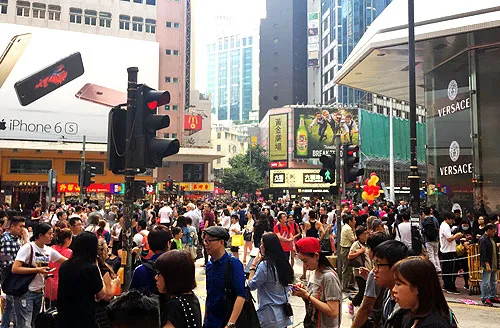
UnionPay expands in Asia
UnionPay, a leading card payment brand from China is expanding its sights for fast expansion in Asia, and internationally. After 13 years of development, the global UnionPay card acceptance network has extended to more than 150 countries and regions, with over 26 million merchants and 1.9 million ATMs worldwide accepting UnionPay cards.
Following the take-off of China’s economy and the shift in its population’s consumption patterns, UnionPay has become the largest international bankcard brand by its issued card base, in just over a decade.
UnionPay in Hong Kong and abroad
Since the launch of its Hong Kong operations in 2004, the first market UnionPay expanded into outside of the Chinese mainland, the territory has become one of UnionPay’s fastest-growing markets.
At its initial stage of development, Hong Kong UnionPay mainly targeted mainland Chinese tourists. Subsequently, it began to target Hong Kong and Macau residents with convenient, innovative and secure payment services. In Hong Kong, UnionPay is now ranked first among all newly-issued bankcards.
In recent years, UnionPay International has steadily grown the UnionPay application network. The card is widely accepted at almost all POS terminals and ATMs in Hong Kong, allowing UnionPay cardholders to easily make payments at merchants or withdraw cash at ATMs. They can also enjoy other services such as emergency cash assistance and cross-border online payments.
As for local card issuance, almost all issuers in Hong Kong issue the UnionPay card. By November last year, more than 16 million UnionPay cards have been issued. With Hong Kong’s population of 7.3 million, this averages out to each person in Hong Kong having two UnionPay cards. UnionPay card products issued in Hong Kong include its RMB /HKD debit card, dual-currency debit card, RMB /HKD credit card, dual-currency credit card and HKD prepaid card.
As UnionPay cards are accepted in more than 150 countries and regions, a growing number of Hong Kong residents are using their UnionPay cards abroad, particularly to enjoy exclusive privileges offered by global businesses.
UnionPay cards have become an important payment option for daily purchases and international travel for Hong Kong residents. The total rate of transactions volume of Hong Kong-issued UnionPay cards in Hong Kong and in regions outside Hong Kong and the Chinese mainland has far exceeded that of the Chinese mainland’s issued cards.
Last year, the increase in purchase volume of Hong Kong-issued UnionPay cards in Japan and Thailand exceeded by about 100%. Hong Kong cardholders also use UnionPay cards frequently in Europe, South Korea and Taiwan.
UnionPay is continuously working to make its cards the first choice of payment for Hong Kong residents abroad. It offers exclusive privileges such as global restaurant reservations, airport VIP lounges and taxi services. The UnionPay tourism tips website, which has online activities with rewards, offers Hong Kong residents abroad visitor information such as exchange rates and weather forecasts.
For the company’s future development, Carlson Li, general manager of UnionPay International Hong Kong, says the next target for the company is to constantly increase brand awareness. First, UnionPay International Hong Kong will continue to grow its issued card base and launch various value-added services for the different segments of users. Second, it will offer privileges at overseas destinations popular among Hong Kong residents. Third, it will introduce more innovative products and services to meet its customers’ demands.
UnionPay ‘QuickPass’
Based on the mature acceptance environment in North-east Asian countries, Hong Kong and South Korea have been chosen as test markets for UnionPay’s innovative new services. The company’s contactless petty sum business and merchant RMB clearing business were first launched in Hong Kong, followed by its mobile payment business.
With more than 200 million mobile and online worldwide UnionPay users and with mobile payments identified as a growing future trend, UnionPay International will expand in this area and is aggresively approaching partners for these two platfoms.
Li says that UnionPay International has invested heavily in promoting UnionPay QuickPass, which has grown in terms of scale and range of application, to provide card users a new payment experience offering greater flexibility. Currently, Hong Kong and Taiwan have almost more than 10,000 POS terminals with the UnionPay QuickPass function at popular locations such as Sogo and 7-Eleven stores, where cardholders may make payments by just placing the UnionPay QuickPass activated card at the terminal.
According to Li, it is especially important to understand local cultures and consumer preferences. As such, in partnership with locally renowned businesses, UnionPay International has launched various promotions for Hong Kong and Macau UnionPay cardholders each year.
Examples include QuickPass privileges offered by Toys “R” Us, Macau New Yaohan, as well as spending privileges offered by F&B and retail businesses at Hong Kong’s Lan Kwai Fong and V City market.
UnionPay now has 90% coverage with many retail and F&B merchant outlets such as Hard Rock Cafe, Excelsior Hotel, Tao Heung Group of restaurants, Hong Kong Harbour City mall and the World Trade Centre mall in Hong Kong’s Causeway Bay.
UnionPay has realised extensive acceptance in most Asian countries and regions with issuance in nearly 30 Asian markets.
Cross-border applications
UnionPay is actively promoting the cross-border application of innovative payment products and services. Overseas acceptance of its UnionPay QuickPass product has achieved initial success with Hong Kong, Macau, Taiwan, South Korea, Australia and Singapore having launched UnionPay QuickPass services.
To date, more than 10 million online merchants in more than 100 countries and regions outside the Chinese mainland accept online payments with UnionPay cards.
UnionPay International looks to continue to accelerate the development of its mobile payment business, develop traffic payment innovation in partnership with T-money in South Korea, and launch mPOS services to acquire more business in Taiwan.
UnionPay in other parts of Asia
UnionPay has realised extensive acceptance in most Asian countries and regions with issuance in nearly 30 Asian markets.
In developing countries such as Laos, Burma and Thailand, UnionPay International actively takes part in the building of bankcard facilities and infrastructure with advanced payment technology and standards to promote the electronic development of the countries’ local currencies. UnionPay has also launched several pilot projects in the areas of mobile payment and big data in the Asian market.
South Korea: Almost all merchants that accept signature payment accept UnionPay credit cards, and 1,430,000 merchants accept payment with PIN with the card. UnionPay cardholders can withdraw cash at more than half of the ATMs in the country. Additionally, almost all local taxis in South Korea are able to accept payments via these credit cards.
Japan: UnionPay cardholders can withdraw cash at nearly 80,000 ATMs in Japan, making UnionPay’s coverage rate of ATMs the No.1 among foreign card brands in the country. About 400,000 merchants across Japan accept UnionPay cards; these include major cities in the country such as Tokyo and Osaka, as well as second-tier and third-tier cities in Japan.
South-east Asia: UnionPay sees growth potential in this region. It is aggressively expanding and launching new and customised outreach programmes for the local markets.
For example, in the Philippines, where the usage of credit cards is low due to the low-income mass market in the country, UnionPay is testing out the promotion of its prepaid card product where a minimum income level is not required, and thus, barriers to entry to obtain such a card is low.
In Singapore, almost all ATMs and more than 70% of merchants, such as Shaw Studios, Singapore Petroleum, Sheng Siong, Kinokuniya and Peach Garden, accept UnionPay cards.
Taiwan: Similarly, almost all ATMs and more than 70% of merchants in Taiwan accept UnionPay cards — these include department stores, restaurants, specialty stores and tourist spots. More than 5,000 POS terminals, including those in the Kinmen, Matsu and Penghu territories, have activated the UnionPay QuickPass service.
UnionPay cardholders can not only take the high-speed rail, Taiwan rail and Taiwan taxis with UnionPay cards, but also make payments with UnionPay cards using the UnionPay mPOS in Taipei’s night markets. Additionally, a number of popular online merchants in Taiwan have partnered with UnionPay online payment service in industries such as tourism, online gaming, education and branded garments.



















 Advertise
Advertise






